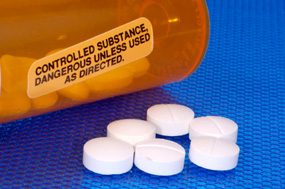
The Perils of Painkillers
It’s become all too common to read news headlines about another celebrity drug-related death. These headlines are symptoms of a growing problem that is having devastating effects on the public at large.
Every day, more than 100 people overdose and die from perfectly legal prescription medications and another 6,700+ are treated for abuse in U.S. hospital emergency departments. Prescription drug overdoses are now the leading cause of injury death, surpassing heroin and cocaine deaths combined. Addiction to painkillers is so prevalent that some public health officials call prescription drugs the new gateway to heroin.
How could this happen?
Advanced drugs have improved health and quality of life for many by providing freedom from pain. The flip side of the coin is that many pain-relieving drugs – opioids – are highly addictive.
There’s no single reason why addiction has soared, but rather a combination of reasons. In addition to being highly effective at relieving pain, opioids are also anxiety relievers with intoxicating effects and therefore rife for abuse. Much of the problem is people taking these drugs for nonmedical reasons. But many people who are taking medication for legitimate reasons can develop addictions, too.
One issue is access and availability. Powerful opioids that were once used for pain management in terminal cancers are now often prescribed for more commonplace injuries and conditions. The public is often unaware just how powerful these medications are. This lack of awareness can lead to overreliance, casual use, dangerous interactions and improper storage.

What you can do to prevent problems
While proper pain medication can be important to recovery, you need to be an educated and informed consumer. Here are recommendations from public health authorities:
- Use prescription painkillers only as directed by a health care provider.
- Tell your doctor if you are taking any other prescriptions, OTC medicines or dietary supplements.
- Ask about potential interactions with other drugs.
- Talk to your doctor about the addictive properties of the drug, if there are alternatives and the lowest dose to do the job.
- Never use another person’s prescription and never share your prescription with others.
- Risks for addiction increase when drugs are used in ways other than as prescribed (at higher doses, combined with other drugs).
- Store prescription painkillers in a secure place and dispose of them properly.
- Never mix prescription pain medication with alcohol – even small amounts can be lethal.
If you are concerned that you or a loved one may have a problem with prescription drug dependence, remember, your EAP is here to help. Why not discuss it with a professional, nonjudgmental counselor? Please give some thought to contacting your EAP today! Remember that all conversations with the EAP are protected under Federal privacy regulations.
1.800.252.4555 or 1.800.225.2527
View more newsletters at www.theEAP.com
